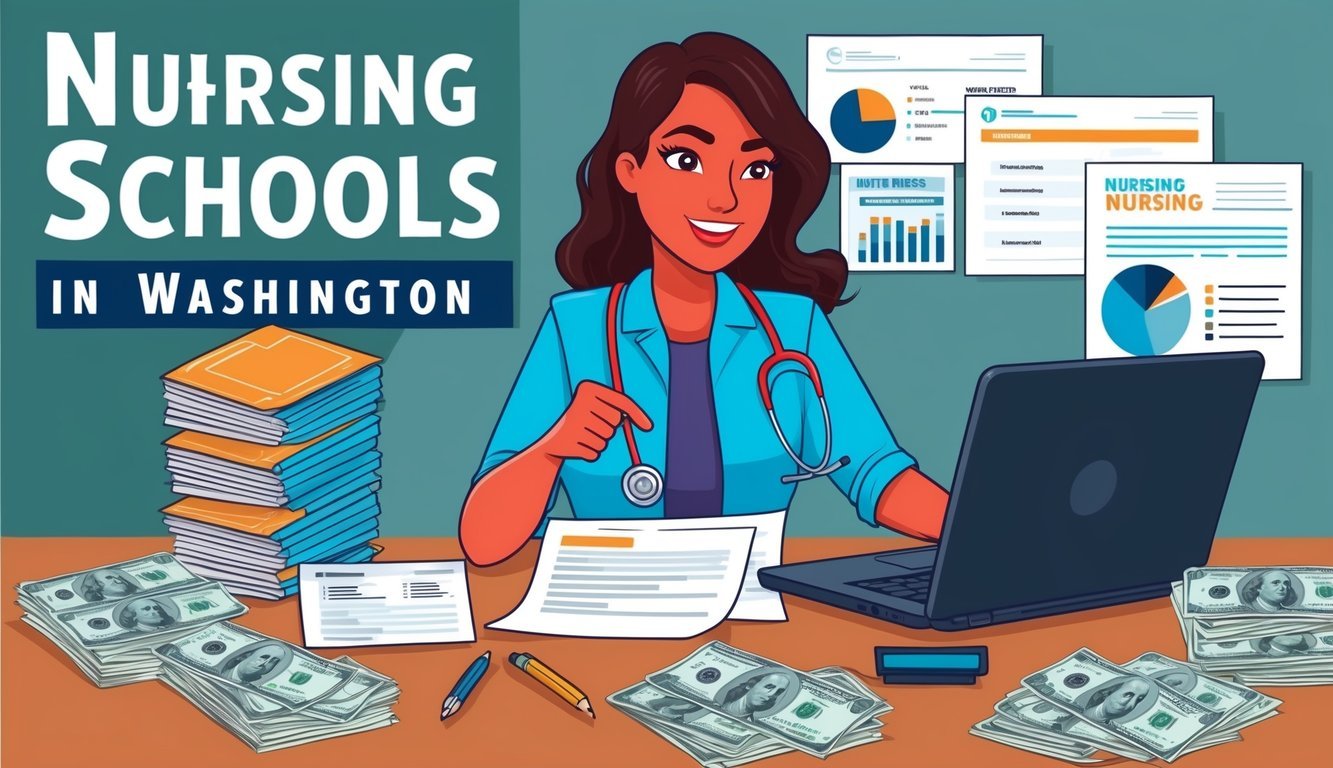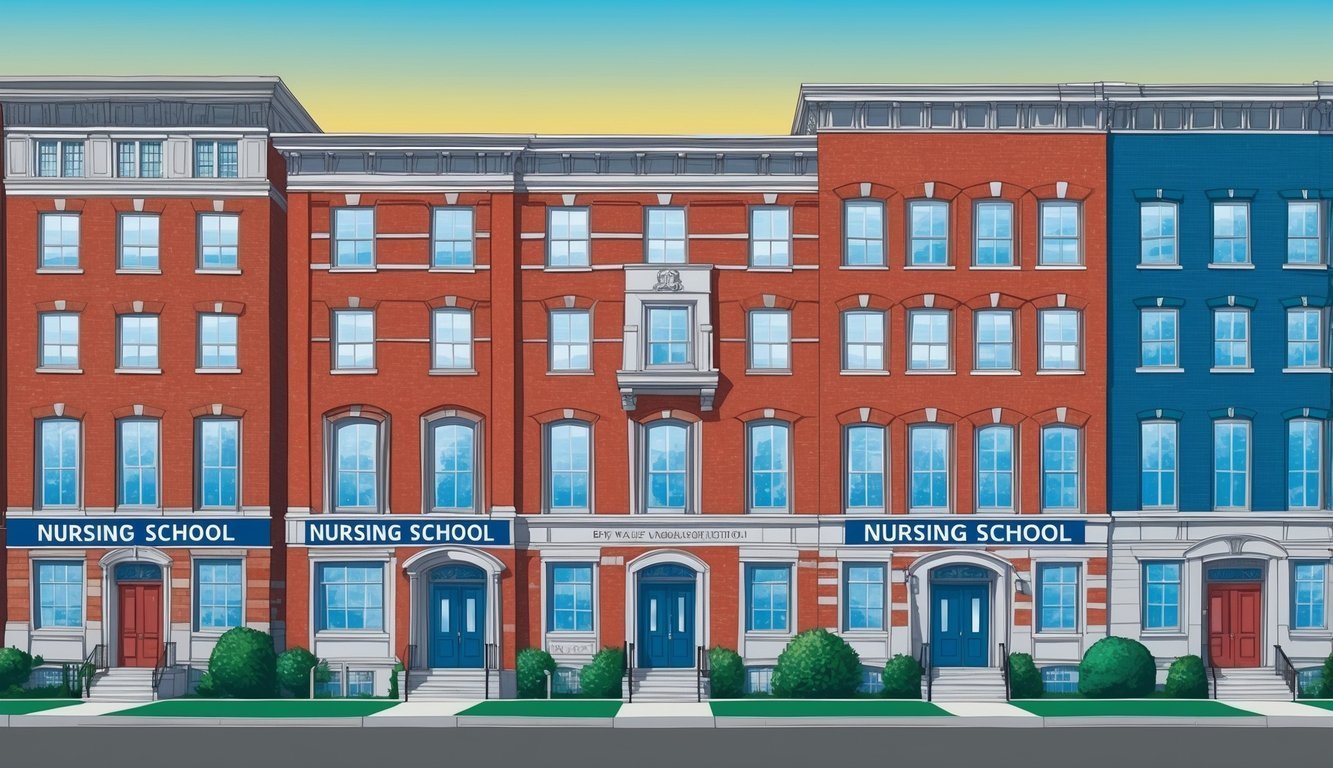Choosing the right nursing school is a crucial step towards a successful nursing career. Washington offers a range of accredited programs that prepare you for various nursing roles, from registered nurse to advanced practice positions. The state boasts several top-ranked institutions where you can gain the necessary skills and qualifications to excel in the healthcare field.
Many nursing schools in Washington provide unique opportunities such as hands-on clinical experience and connections with local healthcare facilities.
Programs vary in focus, whether you are aiming for an Associate Degree in Nursing (ADN), a Bachelor of Science in Nursing (BSN), or a Master of Science in Nursing (MSN).
By exploring the best nursing schools in Washington, you can find the program that best aligns with your career goals and educational preferences.
With an increasing demand for healthcare professionals across the country, pursuing nursing education in Washington can lead to a rewarding and stable career.
The state’s commitment to high academic standards ensures that you will receive quality training, making you competitive in the job market upon graduation.
Consider exploring approved nursing programs to take the first step towards a fulfilling nursing career.
Nursing Education Landscape in Washington State
Washington State offers a diverse range of nursing education options that cater to various career goals.
Understanding the available programs and accredited schools is crucial for aspiring nurses seeking to advance their careers.
Accredited Nursing Schools
In Washington, several institutions provide accredited nursing programs.
Prominent schools include:
| School Name | Type of Program |
|---|---|
| University of Washington | BSN, DNP, RN-to-BSN |
| Washington State University | BSN, DNP |
| Seattle Central College | ADN, BSN |
| Whitworth University | BSN |
| Pacific Lutheran University | BSN, RN-to-BSN |
These programs meet stringent accreditation standards and prepare you for the NCLEX-RN exam.
The University of Washington consistently ranks among the top nursing schools, offering comprehensive training from undergraduate to doctoral levels.
Understanding the Different Nursing Programs
You have several pathways to pursue a nursing degree in Washington:
- Associate Degree in Nursing (ADN): Typically a two-year program that prepares candidates for entry-level RN positions.
- Bachelor of Science in Nursing (BSN): A four-year degree that offers advanced training and better job prospects.
- RN-to-BSN Program: Designed for current RNs with an ADN who wish to earn their BSN.
- Doctor of Nursing Practice (DNP): Focuses on clinical practice and leadership in healthcare settings.
Each program caters to different needs, whether you’re just starting or looking to specialize.
Consider factors like program length, curriculum, and clinical opportunities when choosing the right path for your nursing career.
Leading Nursing Schools and Universities

Washington is home to several esteemed nursing schools and universities, offering robust programs for aspiring nurses.
These institutions combine rigorous academics with practical experiences, preparing students for successful careers in healthcare.
Below are key details about some of the leading nursing schools in the state.
Seattle University
Seattle University’s College of Nursing is known for its innovative nursing programs, including BSN, MSN, and DNP options.
- Acceptance Rate: Approximately 64%
- NCLEX-RN Pass Rate: 90.0%
The curriculum emphasizes social justice and the holistic care of patients.
Students engage in clinical practice in diverse settings, enhancing their learning experiences.
Additionally, the university offers a strong support system, including mentoring and scholarship opportunities.
For more details, visit Seattle University.
Washington State University
Washington State University (WSU) offers a comprehensive nursing program that includes traditional and accelerated BSN tracks.
- Acceptance Rate: Roughly 80%
- NCLEX-RN Pass Rate: 92.5%
WSU is recognized as a Center of Excellence for enhancing student learning.
The university focuses on community health, leadership, and research, providing students with a well-rounded education.
Furthermore, WSU boasts modern facilities and a commitment to innovative teaching methods.
To learn more, visit Washington State University.
Gonzaga University
Gonzaga University features a highly regarded nursing program, offering BSN and MSN degrees.
- Acceptance Rate: Approximately 62%
- NCLEX-RN Pass Rate: 87.7%
The program centers on ethical nursing practice and leadership development.
Gonzaga emphasizes a liberal arts education, ensuring that students are well-prepared for the complexities of patient care.
The integration of clinical experiences in diverse healthcare environments is a highlight of the curriculum.
Explore more at Gonzaga University
Pacific Lutheran University
Pacific Lutheran University (PLU) is known for its emphasis on compassionate patient care in its nursing programs.
- Acceptance Rate: About 75%
- NCLEX-RN Pass Rate: 91.4%
PLU offers both BSN and RN to BSN pathways, focusing on community health and patient advocacy.
The smaller class sizes foster a personalized learning environment.
Hands-on clinical experiences are a central element, allowing students to apply their knowledge in real-world settings.
Find out more at Pacific Lutheran University.
Seattle Pacific University
Seattle Pacific University (SPU) provides a robust nursing program with a strong Christian foundation.
- Acceptance Rate: Approximately 73%
- NCLEX-RN Pass Rate: 92.1%
Programs include pre-licensure BSN and MSN options.
SPU emphasizes ethical nursing practices and community service.
Students benefit from extensive clinical placements in Seattle’s healthcare facilities, gaining valuable experience before graduation.
Discover more at Seattle Pacific University.
University of Washington
The University of Washington (UW) School of Nursing is consistently ranked among the top nursing schools nationally.
- Acceptance Rate: Around 50%
- NCLEX-RN Pass Rate: 93.5%
UW offers a range of programs, including traditional and accelerated BSN, MS in nursing, and a DNP.
The school is renowned for its research and leadership in nursing education.
Students engage deeply with community projects and various clinical opportunities.
Learn more at University of Washington.
Heritage University
Heritage University provides a unique perspective with its commitment to serving underrepresented populations in healthcare.
- Acceptance Rate: Approximately 80%
- NCLEX-RN Pass Rate: 88.0%
The nursing program focuses on culturally competent care and community engagement.
Offering a BSN degree, Heritage emphasizes small class sizes, allowing for personalized attention.
Clinical experiences are integrated throughout the curriculum, ensuring that students are well-prepared to meet the needs of diverse populations.
More information can be found at Heritage University.
Admission Criteria and Acceptance Rates
Understanding the admission criteria and acceptance rates for nursing programs in Washington is essential for prospective students.
This information helps you make informed decisions when applying to various nursing schools, ultimately setting the foundation for your career as a registered or licensed practical nurse.
Prerequisites for Nursing Programs
Before applying to nursing schools in Washington, you must meet specific prerequisites.
These often include:
- High School Diploma or GED: Essential for all applicants.
- Prerequisite Courses: Most programs require courses in biology, chemistry, and psychology. Check each school for specific requirements.
- GPA Minimum: Many institutions expect a minimum GPA, typically around 2.5 to 3.0, depending on the program.
- Standardized Tests: Some schools may require passing scores on tests like the TEAS (Test of Essential Academic Skills).
For instance, Washington State University’s nursing program looks for competitive academic performance and relevant coursework to assess your readiness for nursing training.
Navigating Application Processes
The application process can vary among nursing schools in Washington, but common elements include:
- Application Forms: You need to complete specific application forms which can usually be found on the school’s website.
- Deadlines: Pay close attention to deadlines; for instance, the University of Washington accepts applications once a year, with a typical deadline of January 15.
- Letters of Recommendation: Many programs request at least two letters from professionals or educators who can vouch for your qualifications and character.
- Interviews: Be prepared for potential interviews, which some schools use to evaluate candidates further.
The acceptance rates for nursing programs can also vary significantly.
For example, the acceptance rate at Washington State University is around 83%, indicating a competitive but accessible environment for applicants looking to become registered nurses.
Clinical Experience and Skills Training

Gaining practical experience is essential in nursing education.
In Washington, you will engage in clinical rotations and utilize simulation centers, both crucial for developing your nursing skills.
Clinical Rotations and Placements
Clinical rotations are a vital component of your nursing education.
You will participate in hands-on training at various healthcare facilities, including hospitals, clinics, and long-term care centers.
Typically, you will complete several rotations under the mentorship of experienced nurses and clinical instructors.
This exposure allows you to apply theoretical knowledge in real-world settings, improving your clinical skills and confidence.
You may encounter diverse specialties such as:
- Pediatrics
- Geriatrics
- Surgical Nursing
- Psychiatric Nursing
Such experiences enhance your ability to work in interdisciplinary teams and provide patient-centered care.
For more information, check out Clinical Experience Information.
Simulation Centers for Practical Learning
Simulation centers offer a safe and controlled environment for you to practice essential nursing skills.
These facilities are equipped with advanced manikins and scenarios that mimic real-life patient situations.
In simulations, you can practice critical skills such as:
- Patient assessment
- Medication administration
- Emergency response
Working in these centers prepares you for complex clinical scenarios and enhances your decision-making abilities.
You will receive immediate feedback from instructors, allowing you to refine your techniques and increase your competence.
Simulation training is pivotal in bridging the gap between classroom learning and clinical practice, making it an indispensable part of your education.
Financial Considerations for Prospective Students

Navigating the financial aspects of nursing school can be crucial for your educational journey.
Understanding the options available for financial aid and the specifics of tuition costs will help you make informed decisions.
Navigating Financial Aid Options
When pursuing nursing programs in Washington, you have access to various financial aid opportunities.
Programs such as Pell Grants and Direct Subsidized Loans offer federal aid.
These options can significantly reduce your overall cost.
State-specific aid, like the Washington State Opportunity Baccalaureate Scholarship, also supports nursing students.
This scholarship offers substantial financial support for students in high-demand fields, including nursing.
Scholarships are another valuable resource.
For example, the University of Washington provides financial support tailored for nursing students.
These scholarships help cover tuition and related expenses.
To access these financial resources effectively, make sure to complete the Free Application for Federal Student Aid (FAFSA).
Understanding Tuition Costs
Tuition costs can vary based on whether you are an in-state or out-of-state student.
Below is a brief comparison of typical tuition for Bachelor of Science in Nursing (BSN) and Associate Degree in Nursing (ADN) programs:
| Program Type | In-State Tuition | Out-of-State Tuition |
|---|---|---|
| BSN | $10,000 – $14,000 | $30,000 – $40,000 |
| ADN | $6,000 – $12,000 | $20,000 – $30,000 |
These figures vary by institution, so it’s critical to research specific schools.
Additional costs include books, supplies, and clinical fees, which can add up.
Always compare the total expenses of each program to budget accurately.
Utilize the financial support available to you to ease the burden of these costs.

